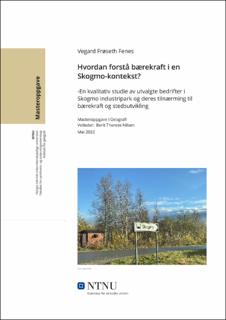| dc.contributor.advisor | Nilsen, Berit Therese | |
| dc.contributor.author | Fenes, Vegard Frøseth | |
| dc.date.accessioned | 2022-07-14T17:21:02Z | |
| dc.date.available | 2022-07-14T17:21:02Z | |
| dc.date.issued | 2022 | |
| dc.identifier | no.ntnu:inspera:108357355:16249283 | |
| dc.identifier.uri | https://hdl.handle.net/11250/3005595 | |
| dc.description.abstract | I denne masteroppgaven har jeg undersøkt hva som motiverer bedrifter til å ta bærekraftige valg i en rural kontekst, sett i sammenheng med lokal og regional stedsutvikling. Utgangspunktet for oppgaven er industrimiljøet som har vokst frem på tettstedet Skogmo i Overhalla kommune. Siden 1940-tallet har industrien på stedet utviklet seg fra ensidig foredling av trevirke, til et mangfold av moderniserte næringsaktører innenfor bygg- og anleggsvirksomhet, samt industri. Overhalla ligger i regionen Namdal, som tradisjonelt har hatt høy sysselsetting innenfor primærnæringer som fiskeri og jordbruk. Statistikk viser imidlertid at det har vært en vekst innenfor industriarbeidsplasser i Overhalla og den omkringliggende regionen de siste årene. Bærekraftig omstilling har blitt en forventning som bedriftene må forholde seg til – både for å møte krav fra myndigheter, kunder, samt morgendagens samfunn. Problemstillingen jeg reiser i oppgaven er derfor: Hva kjennetegner bedrifters rolle i bærekraftig omstilling - med utgangspunkt i Overhalla- samfunnet?
Oppgaven min er tilknyttet det EU- finansierte prosjektet DIALOGUES, som undersøker hvordan innbyggernes engasjement bidrar i energiomstillingen, og inspirerte meg til å gjennomføre en kvalitativ studie blant medlemsbedrifter i industriparken. I intervjuundersøkelsen har jeg prøvd å belyse hva informantene legger i begrepet bærekraft, sett i en Skogmo- kontekst.
Dataene er innhentet gjennom intervju med sju ansatte og ledere blant utvalgte bedrifter i industriparken. Lokalhistorie, ulike avisutklipp og muntlig kommunikasjon har vært betydningsfullt for å få innsikt i det historiske bakteppet for industriutviklingen på Skogmo. Mine funn viser at Skogmo- miljøet representerer en kraft for innovasjon og verdiskaping i regionen, som også muliggjør omstilling. I intervjuene kommer det frem at bedriftene ser klare fordeler ved å være en del av et større fellesskap i industriparken. Dessuten er arbeidsplasser et viktig premiss for at folk skal bli boende i regionen, samtidig som bedriftene må gjøre grep for å sikre riktig kompetanse i fremtiden. En annen ting som kjennetegner små samfunn, som Skogmo og Overhalla, er de tette sosiale båndene. Jeg argumenterer for at det kan gi muligheter for å lykkes med sosial bærekraft. Videre er kunnskap om stedlige forhold viktig for å lykkes i arbeidet med bærekraftig omstilling. | |
| dc.description.abstract | In this master’s thesis I have studied what motivates companies to act sustainably in a rural context, from perspectives inspired by local and regional place development. The orign for the project is an industrial environment in the town of Skogmo in Overhalla municipality. Since the 1940s, the companies have developed from one-sided processing of wood to a variety of modern business actors within construction and industry. Overhalla is a part of the Namdal region, who has traditionally been characterized by high employment within agriculture. However, statistics show that the proportion of industrial jobs in the region has increased in the recent years. Sustainable transitions are an expectation that companies must implement in their business – both to meet demands from customers, authorities, and the society of tomorrow. The question I raise in this thesis is therefore: What role does companies play in sustainable transitions, seen from a rural perspective.
The master’s project is associated with the EU- founded project DIALOGUES. DIALOGUES looks into the role and contribution of citizens’ engagement in the energy transition and inspired me to conduct a qualitative study among member companies in the industrial park. In the interviews I investigated how my informants understand the concept of ‘sustainability’, in a “Skogmo”-perspective.
The qualitative data in the thesis was developed through interviews with seven employees and managers among selected companies in the industrial park. Other sources, such as local history, newspapers and oral information have been important to gain insight into the historical background of the industry development at Skogmo. The findings of the project show that the Skogmo environment represents a power for innovation and economic growth in the region, who also makes transitions possible. From the interviews, it seems clear that the companies find great benefits from being part of a fellowship in the industrial park. Available jobs are important to make it possible living in the region, and the companies must therefore take action to ensure that that a variety of jobs within the needs of the future will be available in the region. Close social ties are characteristic for small communities. I argue that they can be an asset for interaction and provide opportunities for successfully increasing the community’s social sustainability. Furthermore, I argue that knowledge of spatial conditions is a crucial factor for success in sustainable transitions. | |
| dc.language | nob | |
| dc.publisher | NTNU | |
| dc.title | Hvordan forstå bærekraft i en Skogmo-kontekst? | |
| dc.type | Master thesis | |
